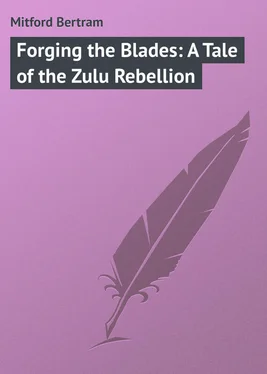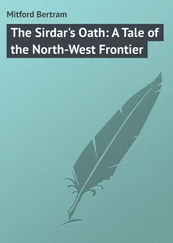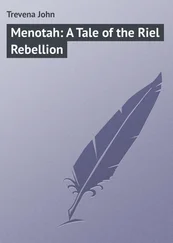Bertram Mitford - Forging the Blades - A Tale of the Zulu Rebellion
Здесь есть возможность читать онлайн «Bertram Mitford - Forging the Blades - A Tale of the Zulu Rebellion» — ознакомительный отрывок электронной книги совершенно бесплатно, а после прочтения отрывка купить полную версию. В некоторых случаях можно слушать аудио, скачать через торрент в формате fb2 и присутствует краткое содержание. Жанр: foreign_prose, на английском языке. Описание произведения, (предисловие) а так же отзывы посетителей доступны на портале библиотеки ЛибКат.
- Название:Forging the Blades: A Tale of the Zulu Rebellion
- Автор:
- Жанр:
- Год:неизвестен
- ISBN:нет данных
- Рейтинг книги:4 / 5. Голосов: 1
-
Избранное:Добавить в избранное
- Отзывы:
-
Ваша оценка:
- 80
- 1
- 2
- 3
- 4
- 5
Forging the Blades: A Tale of the Zulu Rebellion: краткое содержание, описание и аннотация
Предлагаем к чтению аннотацию, описание, краткое содержание или предисловие (зависит от того, что написал сам автор книги «Forging the Blades: A Tale of the Zulu Rebellion»). Если вы не нашли необходимую информацию о книге — напишите в комментариях, мы постараемся отыскать её.
Forging the Blades: A Tale of the Zulu Rebellion — читать онлайн ознакомительный отрывок
Ниже представлен текст книги, разбитый по страницам. Система сохранения места последней прочитанной страницы, позволяет с удобством читать онлайн бесплатно книгу «Forging the Blades: A Tale of the Zulu Rebellion», без необходимости каждый раз заново искать на чём Вы остановились. Поставьте закладку, и сможете в любой момент перейти на страницу, на которой закончили чтение.
Интервал:
Закладка:
Now this very conservatism on the part of Sapazani rendered him an object of suspicion and distrust among the authorities administering the country, for it pointed to “aims.” The other chiefs were content to come into the townships in grotesque medley of European clothing – as required by law – trousers, a waistcoat and shirt-sleeves, or long overcoats and broad-brimmed hats, that give to any savage an absurd and undignified appearance, but this one not. He was obliged to wear clothing on the occasions when his presence was officially required at the seats of administration, but when he did so he wore a riding suit of unimpeachable cut, and boots and spurs accordingly, but under no circumstances had he ever been known to wear a hat. He would not cover up and conceal his head-ring, as did the others. The fact of his not “falling into line” rendered him open to distrust, as a man with a strong hankering after the old state of things, and consequently dissatisfied with the new, therefore a man who might become dangerous. And there were not wanting, just then, circumstances under which he might become very dangerous indeed.
Sapazani’s kraal was remote from the seat of magistracy of his district, for which reason he was required to present himself in person, on some pretext or other, rather more frequently than was usual. To such summons he never failed to respond without delay. But also he never failed so to present himself without a considerable following. This fact sorely puzzled the authorities. They did not like it; yet to remonstrate would seem to argue that they were afraid of him, an attitude absolutely fatal to the prestige of the ruling race. And the said ruling race needed all its prestige just then, when there were less than a hundred mounted police in the whole of Zululand, and not much more than three times that number of Volunteer Rifles, but scattered throughout the length and breadth of the country pursuing their ordinary civil avocations.
Sapazani was just old enough to have fought as a mere youth in the Zulu war of ’79, and quite old enough to have fought well, and with some distinction on the Usutu side during the struggle which culminated in the exile of his present chief to Saint Helena. Now his relations with his said present chief – repatriated – were something of a mystery to the ruling race, and there were those who thought that given the opportunity he would not be averse to usurping his present chief’s position and authority; for he, too, came of royal stock, in that he was of the Umtetwa tribe and could claim descent from the House of Dingiswayo. His relations with Ben Halse dated from the time of the above-mentioned struggle in which his father, Umlali, had been killed, thus leaving him in undisputed succession to the chieftainship.
The sun was dropping over the lip of cliff-ringed crescent which shut in the hollow. Sapazani sat outside his hut, surrounded by three or four indunas, taking snuff; in this, too, he was conservative, not having yet come to the European pipe. The cattle were being brought in for milking, and the frantic bellowing of calves, and the responsive “moo” of their mothers, mingled with the shrill-voiced shouts of the young boys who were driving the respective herds. His thoughts were busy. News – great news – had come in. Down in Natal events were stirring. The tribes there were arming, and they were looking towards Zululand. No longer were they the white man’s dogs, as during the great war, when they had dared to come into the Zulu country to fight for the white man, and side by side with him. Now they were looking towards the House of Senzangakona, and – the representative of that House was dumb.
The song and clear laughter of women and girls bringing up water from the stream sounded pleasant and melodious upon the evening air, and the deep-toned voices of men, criticising the condition and well-being of the cattle in the kraal.
Blue reeks of smoke rose from the huts. The whole scene, in short, was one of quiet and pastoral peace; but in the chief’s plotting brain peace was the last consideration that entered. Peace! What was he but a mere slave – obliged to go here, or go there, at the bare official word? Peace! All the blood in his warrior veins fired at the word. Peace! on those terms! Every downy-faced youth among the whites expected him to salute him as a king: he, the descendant of kings. The black preacher of another race, who had stealthily visited his kraal two moons back preaching “Africa for the Africans,” had inspired him with ideas. He had listened, had turned the man, so to say, inside out; but one idea had taken hold. Sapazani was shrewd. He knew that by force of arms, by sheer force of arms alone, his people were incapable of holding their own. They could “eat up” every white in the country, and that in a single night. But they could not hold it afterwards. The whites could pour in such reinforcements as to eat them up in turn. But the one idea which the preacher had left in his mind was that the whites were so divided among themselves that there would be those high in the councils of the dominant nation who would compel their countrymen to concede to the Zulus their own land. It was rather mysterious, but he had heard it from other sources, from one, especially, of weight and knowledge, and more than half believed it. If that were so, and they could make a fight for it, why, then, all this officialdom might soon become a thing of the past, and he – Sapazani – a chief of weight, and in the full prime of his intellectual and physical gifts, and the descendant of a royal house, he saw himself king. As well as shrewd, Sapazani was ambitious.
“And the last word of U’ Ben was ‘No,’” the chief was saying.
“That was it,” answered Undhlawafa. “But that his child came up while we talked I think it would have been ‘Yes.’”
“Ha!” ejaculated Sapazani, now vividly interested. “What said she?”
“That I know not, son of Umlali, for I understand not the tongue of the Amangisi. But I spoke again about it yesterday, and again he refused.”
“Strange!” said the chief. “U’ Ben loves money.”
“Who does not, son of Umlali, since the whites have brought it into the country? But though U’ Ben loves money, I think that he loves his child more.”
The chief made no reply. A very curious vein of thought – for a Zulu – was running through his mind, of which, could Ben Halse have had the smallest inkling, that estimable trader would have cleared out at very short notice and have set up in business in some other part of South Africa considerably remote from this.
“U’ Ben is a fool,” he rejoined after a pause. “He must be growing too rich. We can get them brought,” he went on, talking “dark,” “and for less money. But he has always been a friend, and I wanted to give it to him. Is his mouth really shut, think you, Undhlawafa?”
“It is, I think. Besides, there is that about him which does not incline him to move other people to talk,” answered the induna meaningly. “And now, son of Umlali, what of the messenger?”
The chief’s face grew heavy, deepening into a scowl.
“Who are these that they are to order us hither and thither?” he said. “It is only a day ago (figurative) that I was required to attend. Let the dog come forward.”
In compliance with this mandate the said “dog” presently did appear, in the shape of a well-looking, middle-aged Zulu, wearing a long coat with brass buttons, also the head-ring. He saluted the chief respectfully enough, but Sapazani gazed at him sourly.
“So thou art here again, Manyana-ka-Mahlu, and still as the white man’s dog? Hau !”
The point of which remark was that the man addressed was court messenger at the magistracy in whose jurisdiction Sapazani was resident.
Читать дальшеИнтервал:
Закладка:
Похожие книги на «Forging the Blades: A Tale of the Zulu Rebellion»
Представляем Вашему вниманию похожие книги на «Forging the Blades: A Tale of the Zulu Rebellion» списком для выбора. Мы отобрали схожую по названию и смыслу литературу в надежде предоставить читателям больше вариантов отыскать новые, интересные, ещё непрочитанные произведения.
Обсуждение, отзывы о книге «Forging the Blades: A Tale of the Zulu Rebellion» и просто собственные мнения читателей. Оставьте ваши комментарии, напишите, что Вы думаете о произведении, его смысле или главных героях. Укажите что конкретно понравилось, а что нет, и почему Вы так считаете.












